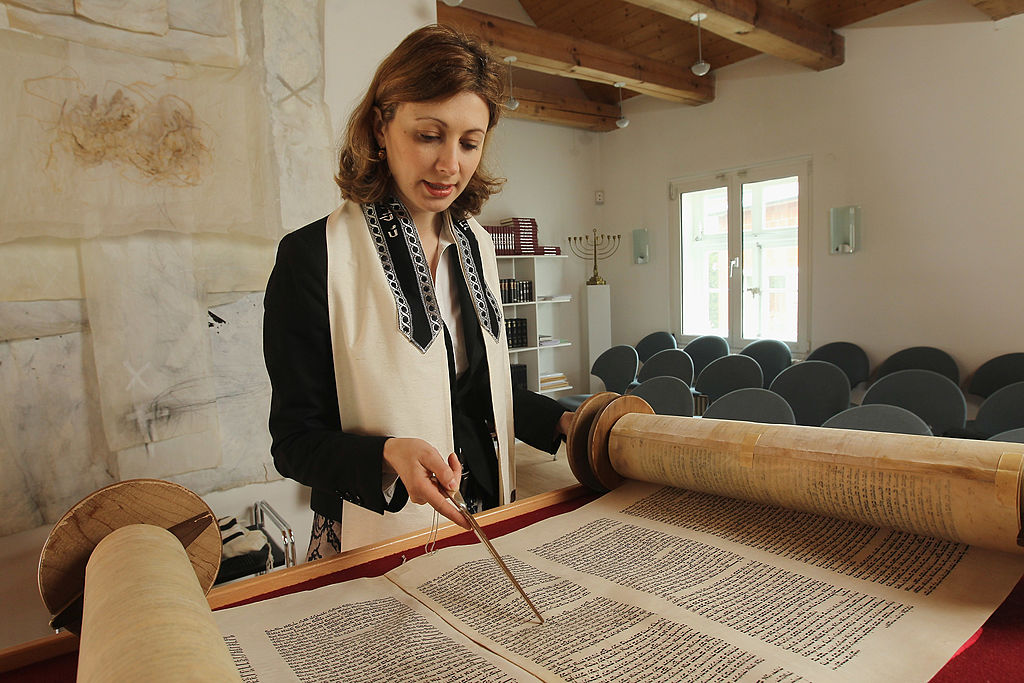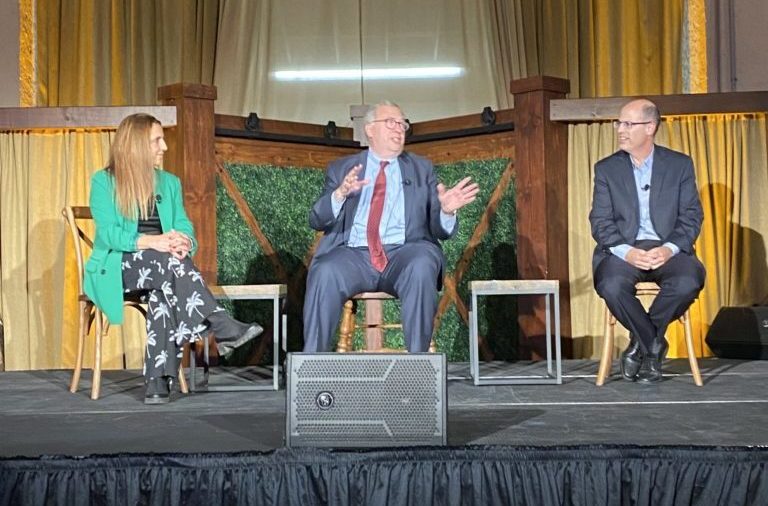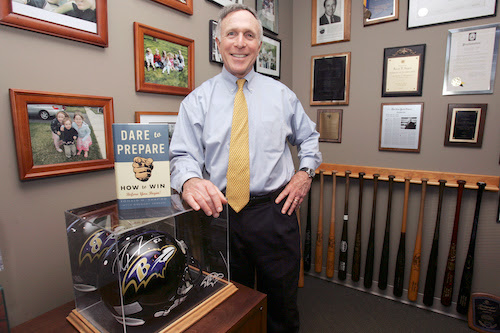Your Daily Phil: On the ground at the Jewish Funders Network conference
Good Tuesday morning!
Ed. note: Today’s is the second and final edition of eJewishPhilanthropy’s newsletter written from the sunny environs of the PGA National Resort in Palm Beach, Fla., where Dan Brown and Ben Sales are covering the Jewish Funders Network International Conference. If you’re in Florida with us, come say hi!
Hello (again) from Palm Beach, where the weather is hotter, people have dressed a little more formally, a fire alarm emptied the building and the Oscars are not the only awards being discussed.
Yesterday was the only full day of the Jewish Funders Network conference, which kicked off Sunday afternoon and ends at lunchtime today. And while philanthropy was certainly discussed, it wouldn’t be accurate to describe the day as a niche gathering focused on the praxis and philosophy of allocating money to Jewish organizations.
Sessions throughout the day touched on subjects that wouldn’t have been out of place at any general-interest American Jewish conference. The morning plenary featuring journalists Anne Applebaum and Bret Stephens, moderated by Forward Editor-in-Chief Jodi Rudoren, was about threats to democracy — a conversation that focused mostly on Ukraine and domestic American politics. Only at the end did Rudoren draw the discussion back to what threats to democracy mean to donors.
Other Monday sessions were relevant to funders, but would have been just as appropriate under a different lens — from a discussion of Haredi Orthodox integration in Israel to two panels about fighting antisemitism. A panel titled “What Are the Next Big Philanthropic Moonshots?” did discuss the dynamics of executing an ambitious vision, encouraging funders to take more small risks in order to give more new ideas a chance to succeed. But speakers also spent a chunk of time discussing how the pandemic changed the way Jews discuss God and relate to their local pulpit rabbis in an era of virtual synagogue where the pastoral options are infinite.
A couple of attendees pointed out that alongside the funders themselves and foundation employees, a fair number of organizational professionals, whose groups also give some grants, are at the conference. One told us that they were attending the conference in lieu of their organization’s funders. But the CEO of one of the groups that both gives and receives funding, Sheila Katz of the National Council of Jewish Women, said she appreciated the discussions — and especially that they were happening face-to-face.
“We’re gathering to learn from each other,” Katz said, noting that other current and former leaders of the group were also at JFN. “It’s just one of the first times we’ve been able to be together in person, and that’s one of the most amazing parts of this conference.”
When we asked Andrés Spokoiny, JFN’s president and CEO, about this, he said that the conference was still meant for funders and their foundation staff, who make up, respectively, 40% and 60% of attendees. Attendance is still comparatively intimate — about 500 people — and limited to funders, broadly defined; other Jews need not apply. And numerically, Spokoiny said, funders do not make up a smaller percentage of conference attendees than they have in years past. The guest list does have a roster of big names — like Bronfman, Kanfer and Grinspoon — in addition to funders about whom, Spokoiny said, “in 10 years the names will be recognizable.”
Plenty of programming, he said, does focus on the nitty-gritty of giving away money (like sessions about impact investing, intergenerational philanthropy or a networking session on Ukraine, much of which was closed to press), but that it’s also worth discussing big ideas that are relevant to everyone. “It’s about elevating conversations about big issues in the Jewish community,” Spokoiny told eJewishPhilanthropy. “Democracy is one of those issues. It kind of cuts across everything. If we don’t have democracy there’s not much we can do.”
Spokoiny acknowledged that the conference has become one of the few spaces where a group of American Jews across the ideological and religious spectrum, and with outsize financial power, can gather to discuss a broad range of topics. The Jewish Federations of North America’s General Assembly is invite-only this year, a biannual shift that began a few years ago, and the AIPAC’s Policy Conference, formerly the largest annual conference of Jews, has been canceled two years in a row.
“There’s not a lot of other forums where these conversations happen,” Spokoiny said. “There’s no public square in the Jewish community… We can’t be the public square for everybody, but for the funders, we can.”
One moment of literal gathering came early in the plenary on democracy, soon after Rudoren had obliquely criticized Florida’s new law restricting discussion of sexual orientation in schools. The fire alarm went off in the plenary hall, driving hundreds of people to crowd together on an outdoor patio. As everyone left the building, Rudoren quipped into the mic, “It’s because I said ‘gay,’” drawing a laugh.
ACCEPTANCE SPEECHES
Awardees at JFN call for Jewish funders to broaden their reach


Courtesy/screenshot
The three people presented with awards at the Jewish Funders Network International Conference all encouraged Jewish philanthropists to expand their giving — and all three had slightly different suggestions for how they could do so, reports eJewishPhilanthropy’s Ben Sales.
‘Transformational impact’: The conference’s themes so far have been how best to mobilize aid to Ukraine and how to launch more ambitious initiatives as COVID-19 restrictions fade. Tova Katz, a senior portfolio manager at the One8 Foundation, struck on those themes when accepting the J.J. Greenberg Memorial Award, which honors foundation professionals age 40 and under who work in grantmaking and demonstrate leadership. She also called for more support for women leaders at Jewish organizations. “This is our moment,” she said in her acceptance speech on Monday. “We’re emerging from COVID restrictions with renewed energy and optimism. We have the leadership resources and creativity we need to make big, bold, transformational impact.”
Promoting data: One day earlier, accepting the Ilia Salita Excellence in Research Award, Tufts political science professor Eitan Hersh encouraged Jewish funders to invest more in academic studies that can provide a clearer picture of the state of the Jewish community. Hersh accepted the $15,000 award from the Genesis Philanthropy Group on behalf of himself and Harvard University doctoral candidate Laura Royden, for their study on antisemitic attitudes across the generational and political spectrum. “There are a lot of exciting developments in the social sciences to study issues [that are] of concern to the Jewish community,” he said.
A sense of injustice: On Monday night, Nik Kafka was awarded the $100,000 Charles Bronfman Prize, an annual prize given to a humanitarian under 50 whose work is rooted in Jewish values. Kafka is the founder of Teach a Man to Fish, a nonprofit he launched in 2006 that works with educators in low-income countries to teach children skills that will allow them to succeed economically. Because of pandemic-related cancellations in past years, the ceremony also honored the prize recipients in 2019 and 2021. The prize was not awarded in 2020. “After 16 years of doing this work, I still feel this burning sense of injustice for the accidental birth that can deprive the world of millions of exceptional talents,” Kafka said in his speech, referring to children born in extreme poverty. “We have great environmental problems. We have so many social problems. We can’t afford to squander this talent.”
OP-ED PROJECT
The dangers of ‘default’ Jewish leadership


Sean Gallup/Getty Images
“It’s been 50 years this year since the Reform movement began ordaining women as rabbis. Despite the fact that it’s been half a century, and in most liberal Jewish denominations there are more women than men graduating from rabbinical school, women in this role still seem novel and require the gender qualifier ‘women.’ If you look up ‘rabbi’ on a Google image search, you’ll see lots of white men, mostly with beards. I just did this exercise and didn’t see a woman until image 65 in an ad for Hebrew College,” writes Rabbi Amanda Schwartz, an educator in Denver, in an opinion piece for eJewishPhilanthropy.
Picturing a rabbi: “It’s no real surprise that when people picture ‘rabbis’ they don’t picture a woman, a person of color or a trans person because, well, our faces and bodies are not presented as what author Sonya Renee Taylor refers to as ‘default bodies.’ She writes in her book The Body is Not an Apology: ‘Aspects of default body change across culture and geography but it shapes our ideas of normalcy and impacts our social values. Our assumptions about the default identities of race, age, ability, sexual orientation, gender, size and so on become the bedrock upon which societies build body based oppression.’”
Default bodies: “The default body of the American ‘rabbi’ is that of a white, able-bodied, cisgender man. Considering this reality, it’s no real surprise that my role as a rabbi is called into question routinely through microaggressions, which are remarks or actions, often said without the intention of being hurtful, but that call into question a marginalized person’s membership in a group.”
THE PAST IS NO LONGER PROLOGUE
Where is the new roadmap?


iStock
“Philanthropy is alive, well and vibrant, but admittedly more complicated. Despite all the things that draw us apart, however, I contend that what has the greatest potential to bring us together is in our shared commitment to making the world a better place and to improving the lives of people and communities… The past two years have been ones of change and dislocation, a disruption of the norms and practices of the past, and an uneven transition to the reality of today and to the prospect of tomorrow. The one thing we seem to know, that we are sure about, is what we are not really sure of,” writes Avrum Lapin, president of The Lapin Group, in an opinion piece for eJewish Philanthropy.
The COVID excuse: “And many of the changes in the nonprofit arena that we are currently confronting, and navigating, were not caused by COVID, but were certainly accelerated and punctuated by the challenges of the last two years. We were forced to pay attention to and approach things in different ways and often more quickly. We were compelled to revisit organizational missions, purposes and activities — sometimes reaffirming, sometimes adjusting, sometimes revolutionizing things we often knew that we had to do but put off because the “going was good” or we didn’t want to complicate things. We certainly have done things differently, learning to use new tools and employing new strategies for decision making and doing business.”
Worthy Reads
Performative Activism: While social media activism may be expected when tragedy strikes or news happens, expressing concern on social media platforms may be performative grief with little substance, Cole Arthur Riley writes in The Atlantic: “History is unfolding every day, and every day people are at once trying to make sense of it and prove that they are on the right side of it. The invasion of Ukraine, the debate over mask mandates, the tide of attacks against Asian Americans — each worthy of our attention, and even our outrage. Social media is one way to pay attention. But it isn’t the only way. Audre Lorde famously said, ‘Your silence will not protect you.’ This wisdom has been taken to the extreme. To be silent is to be complicit, people (including myself) have said. This can be true. There is certainly a silence born of cowardice, a silence that emboldens oppressors. But sometimes to be silent is to finally become honest. To halt the theater. In the quiet, we at last hear the sound of our own interior world. The pain or numbness. The guilt. The nothing at all.”[TheAtlantic]
Philanthropically Strategic: Writing in Forbes, Sandi Bragar shares four steps to get started in creating a strategy to achieve philanthropic vision, including thinking about impact: “Start by thinking about how you wish to help the areas covered by your mission. Do you want to address current and immediate needs or create long-term effects? Do you want to focus on a specific project, such as renovating and promoting a community center, or give to individuals and organizations that will spread your donations further? Then, how will you assess the results? When clients start giving large amounts, they want to be assured that the funds are being well spent toward their specific mission. So think about how often you want to be updated on the progress or success of a program. Do you want qualitative or quantitative data? Would you like to see external evaluations and auditing? Having these answers in mind will help you to identify the right projects and organizations that will partner with you in the manner you prefer.” [Forbes]
Community Comms
Advance your career. Apply for Spertus Institute’s accelerated Master’s program for Jewish communal executives. Complete your degree in 18 months.
Be featured: Email us to inform the eJP readership of your upcoming event, job opening, or other communication.
Word on the Street
The Central Conference of American Rabbis is holding its 133rd convention in San Diego, Calif., with 300 rabbi attendees who are celebrating 50 years of women in the rabbinate…
Sheryl Sandberg and her fiancé, Tom Bernthal, donated $1 million to United Hatzalah’s rescue efforts in Ukraine…
The European Commission, the government of Canada and dozens of celebrities assembled by advocacy nonprofit Global Citizen — including newly minted Oscar winners Billie Eilish and Finneas, actor Hugh Jackman, Madonna and Grammy-nominee Jon Batiste — are participating in April 8’s “social media rally” to raise awareness for a global pledging summit, “Stand Up for Ukraine.” The summit aims to raise funds for Ukrainian refugees as well as those from conflicts in Afghanistan, South Sudan and Yemen…
The University of California, Berkeley announced a five-year, $12.6 million commitment from alumni Eric and Wendy Schmidt in support of a new research center focused on applying data science to solving environmental challenges…
The Naomi Berrie Diabetes Center at Columbia University received a $20 million gift from Mike and Maria Repoleand the Nonna’s Garden Foundation…
Stephen Shalom, a leader of the U.S. Sephardic Jewish community who promoted Middle East peace and religious tolerance, died at 93…
Disability advocate and activist Sheryl Grossman died at 46 after a yearslong battle with multiple cancers…
Pic of the Day


Courtesy
Jewish Insider’s Ruth Marks Eglash moderates a panel Monday evening at the Jewish Funders Network Conference in Palm Beach, Fla., with David Makovsky (center), Ziegler distinguished fellow at The Washington Institute for Near East Policy and director of the Koret Project on Arab-Israel Relations, and Avi Hasson, CEO of Start-Up Nation Central.
Birthdays


AP Photo/Rob Carr
Attorney, author and sports agent for many athletes including Cal Ripken, Jim Palmer, Brooks Robinson, Kirby Puckett and Eddie Murray, Ronald M. Shapiro…
Chemist, professor at both Hebrew University and UCLA, winner of the 1974 Israel Prize, Raphael David Levine… Organizer of annual morning minyan services since 1983 for runners in the NYC Marathon, Peter Berkowsky… Houston-based labor law, employment law and personal injury attorney, Carol Nelkin… Orthopedic surgeon, former professional boxer, producer and author, Dr. Harold “Hackie” Stuart Reitman… Winner of the 2007 Nobel Prize for economics, University of Chicago professor Roger Myerson… Computer scientist and founder of D. E. Shaw & Co., David Elliot Shaw… Chairman of consulting firm Roubini Macro Associates and professor emeritus at NYU, Nouriel Roubini… Miami businesswoman JoAnne Papir… Co-founder and co-CEO of Cerberus Capital Management, Stephen Andrew Feinberg… Co-CEO of entertainment and media agency William Morris Endeavor, Ari Emanuel… U.S. Sen. (D-NV) Catherine Cortez Masto… Deputy chief of staff at The Rockefeller Foundation and adjunct fellow at The Washington Institute for Near East Policy, Eric Pelofsky… Assistant U.S. Attorney Will Scharf… Communications director at the Democratic Senatorial Campaign Committee, David A. Bergstein… Senior associate at Strategy&, Annie Rosen Pai… Business development manager at Arcadia, Alexander Zafran… Founder of Leopard Strategies, Liz Jaff…








